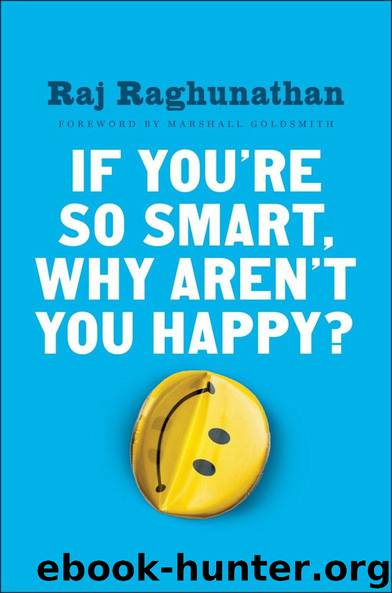1101980737 (N) by Raj Raghunathan

Author:Raj Raghunathan
Language: eng
Format: mobi, azw3, epub
Publisher: Penguin Publishing Group
Published: 2016-04-25T22:00:00+00:00
Placebo Effects: When Subjective Beliefs Shape Objective Reality
A person who believes that “life is benign,” in contrast to one who believes that “life is malign,” will naturally trust that good things will happen to him. Everyone recognizes this intuitively. What many of us don’t immediately realize, however, is that it is impossible not to have an opinion about whether life is good, bad, or indifferent. Even those who do not hold an explicit belief about whether and how much life can be trusted will reflect their beliefs in the implicit attitudes they harbor toward life—in, for example, how optimistic they are, or in how resilient they are after a setback.
What’s even more difficult for many to comprehend—and this may be particularly true for the S-and-S—is that there is no “scientifically valid” belief about how much life can be trusted. Or, put differently, the belief that “life can be trusted” and the associated belief that “everything happens for the best” isn’t any less scientifically valid than are the competing beliefs, that “life is indifferent” or that “life is malign and can’t be trusted.”
That’s the reason I seldom get into an argument with anyone on whether life is good, bad, or indifferent. Such arguments are generally pointless; at best, everyone walks away even more firmly entrenched in their original belief, and at worst, there is bad blood. So I am not going to persuade you to adopt the attitude that “life can be trusted” and that “everything happens for the best.” But given your scientific bent, I believe you would be curious to know why the view that “life can be trusted” is no less scientific—and no more delusional, I might add—than the view that “life is indifferent” or that “life is malign.”
This reason, in short, has to do with placebo effects, which refers to the idea that, at least in some contexts, our subjective beliefs about the truth shape the objective truth. Consider one study conducted by Don Price, a researcher at the University of Florida at Gainesville, and his colleagues. In the study, patients with IBS (irritable bowel syndrome, a painful stomach condition) were divided into three groups. In all three groups, a balloon was inflated in the patients’ rectums. After that, they were asked to rate how painful this experience was. Before the balloon was blown, patients in one group were given an anesthetic (lidocaine) that mutes feelings. The pain experienced by this group, represented by the dark dashed line in the graph, was significantly lower than that experienced by the second group of patients—represented by the solid line—that wasn’t given any anesthetic.
Download
1101980737 (N) by Raj Raghunathan.azw3
1101980737 (N) by Raj Raghunathan.epub
This site does not store any files on its server. We only index and link to content provided by other sites. Please contact the content providers to delete copyright contents if any and email us, we'll remove relevant links or contents immediately.
| Ethics | Etiquette |
| Fashion & Image | Health & Stress |
| Motivation & Self-Improvement | Work Life Balance |
| Workplace Culture |
Tools of Titans by Timothy Ferriss(8396)
Change Your Questions, Change Your Life by Marilee Adams(7782)
Deep Work by Cal Newport(7083)
Playing to Win_ How Strategy Really Works by A.G. Lafley & Roger L. Martin(6306)
Man-made Catastrophes and Risk Information Concealment by Dmitry Chernov & Didier Sornette(6019)
Big Magic: Creative Living Beyond Fear by Elizabeth Gilbert(5771)
Digital Minimalism by Cal Newport;(5765)
Ego Is the Enemy by Ryan Holiday(5450)
The Slight Edge by Jeff Olson(5417)
The Motivation Myth by Jeff Haden(5212)
The Laws of Human Nature by Robert Greene(5208)
Stone's Rules by Roger Stone(5088)
Tuesdays with Morrie by Mitch Albom(4784)
Eat That Frog! by Brian Tracy(4540)
Rising Strong by Brene Brown(4459)
Skin in the Game by Nassim Nicholas Taleb(4248)
The Money Culture by Michael Lewis(4207)
Bullshit Jobs by David Graeber(4190)
Skin in the Game: Hidden Asymmetries in Daily Life by Nassim Nicholas Taleb(4007)
